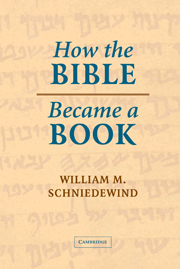Book contents
- Frontmatter
- Contents
- List of Figures
- Preface
- Abbreviations
- 1 How the Bible Became a Book
- 2 The Numinous Power of Writing
- 3 Writing and the State
- 4 Writing in Early Israel
- 5 Hezekiah and the Beginning of Biblical Literature
- 6 Josiah and the Text Revolution
- 7 How the Torah Became a Text
- 8 Writing in Exile
- 9 Scripture in the Shadow of the Temple
- 10 Epilogue
- Suggested Further Reading
- Notes
- Index
3 - Writing and the State
Published online by Cambridge University Press: 16 July 2009
- Frontmatter
- Contents
- List of Figures
- Preface
- Abbreviations
- 1 How the Bible Became a Book
- 2 The Numinous Power of Writing
- 3 Writing and the State
- 4 Writing in Early Israel
- 5 Hezekiah and the Beginning of Biblical Literature
- 6 Josiah and the Text Revolution
- 7 How the Torah Became a Text
- 8 Writing in Exile
- 9 Scripture in the Shadow of the Temple
- 10 Epilogue
- Suggested Further Reading
- Notes
- Index
Summary
Who wrote in antiquity? Why did people write? The origins and spread of writing follow upon the rise of nations and empires in antiquity. Nowhere did writing flourish in the ancient Near East without the auspices of the state. Writing became a part of the self-definition of early civilizations in Egypt and Mesopotamia. It became pivotal to administration and high culture, even though it was essentially restricted to the emergent scribal class. It was a central element of public monuments, even though the public was essentially non-literate. Writing projected royal power in public forums. Public written monuments were not for reading, but were displays of royal power and authority. Even the pettiest would-be kings of the ancient Near East desired their own royal scribes. The flourishing of writing and literature in the ancient Near East cannot be understood without the context of the state.
This chapter sketches out some of the important aspects of the development of writing both in the Near East more generally and in Israel specifically. In antiquity, writing was both complex and expensive. Writing was not a mundane activity. It required institutional support. Writing was primarily an activity of the state. The invention of the alphabet was one of the critical developments leading to the spread of writing outside state-supported institutions. Yet, the alphabet had already been invented at the beginning of the second millennium b.c.e., and this did not immediately result in a surge in literacy throughout the ancient world.
- Type
- Chapter
- Information
- How the Bible Became a BookThe Textualization of Ancient Israel, pp. 35 - 47Publisher: Cambridge University PressPrint publication year: 2004



